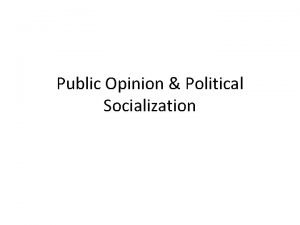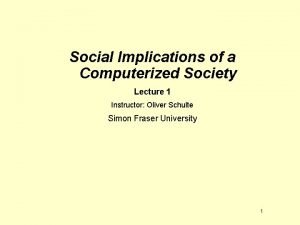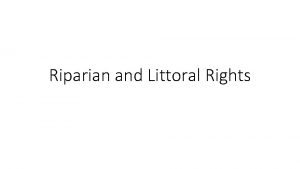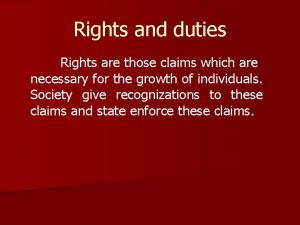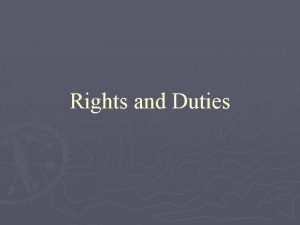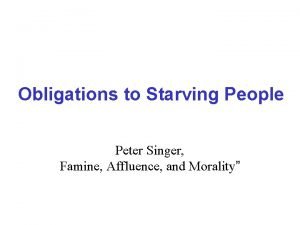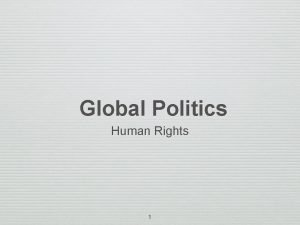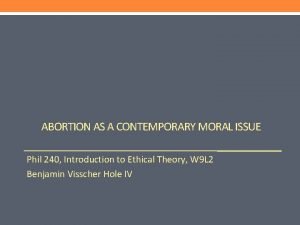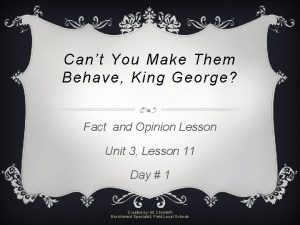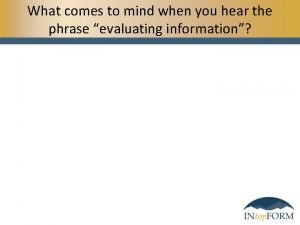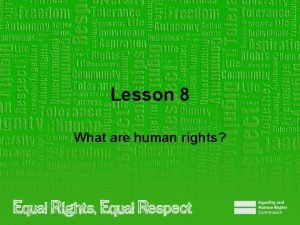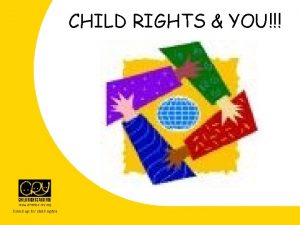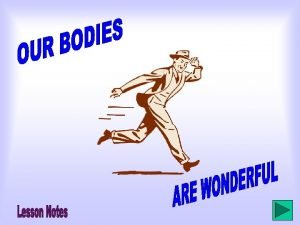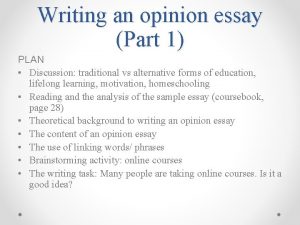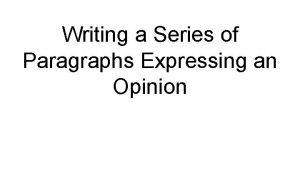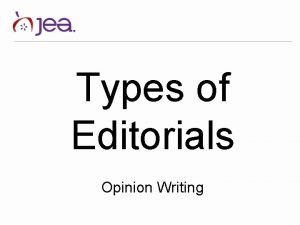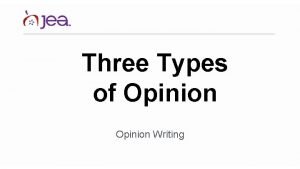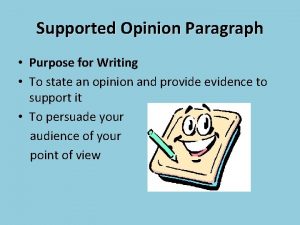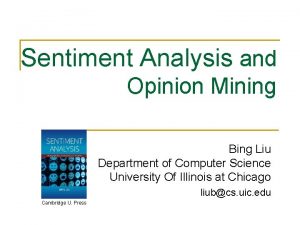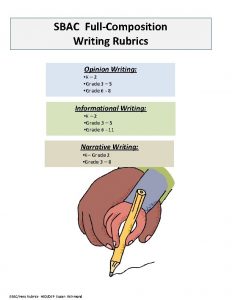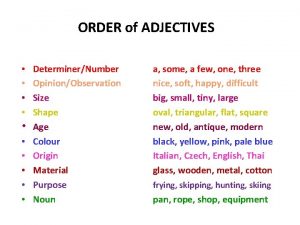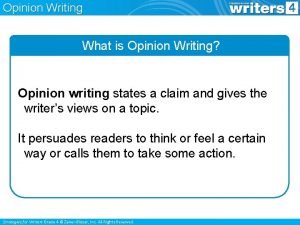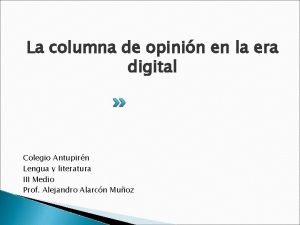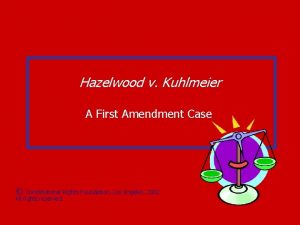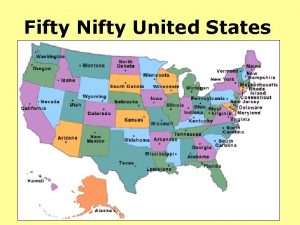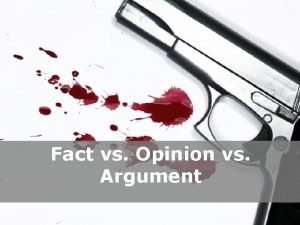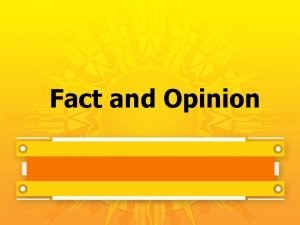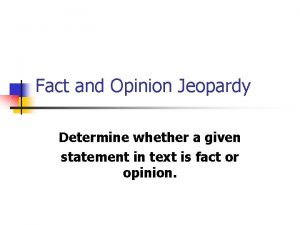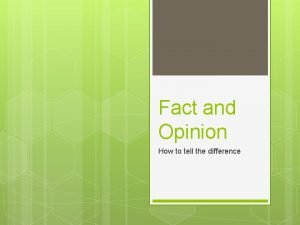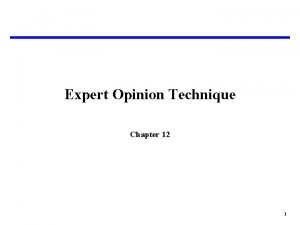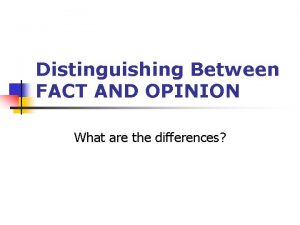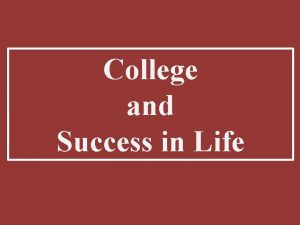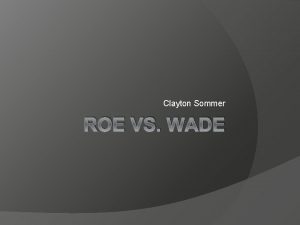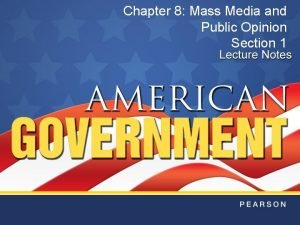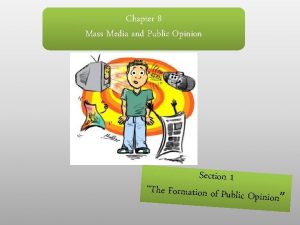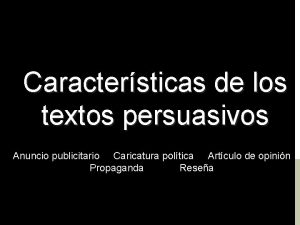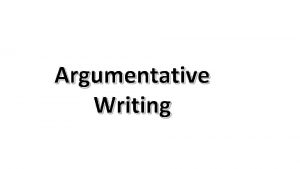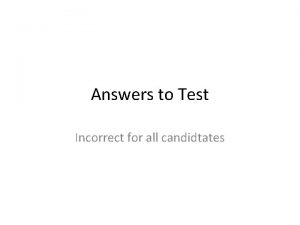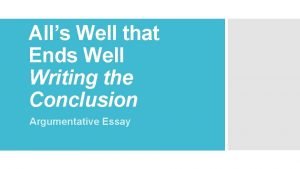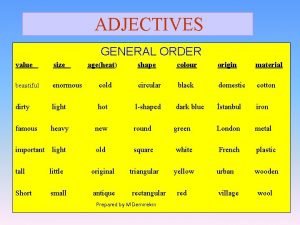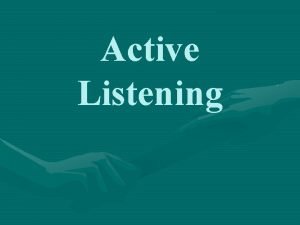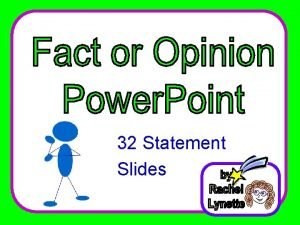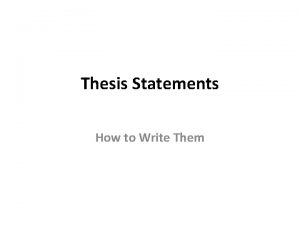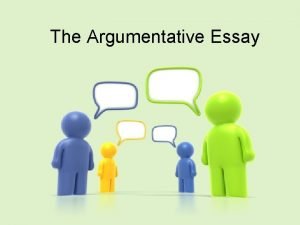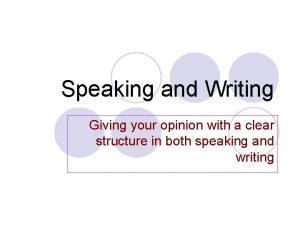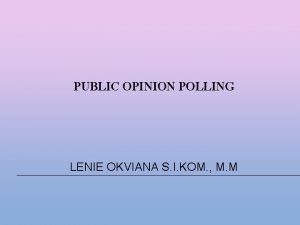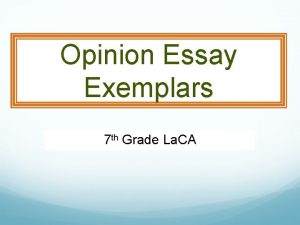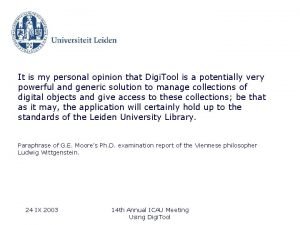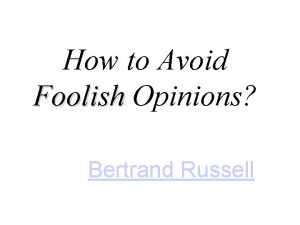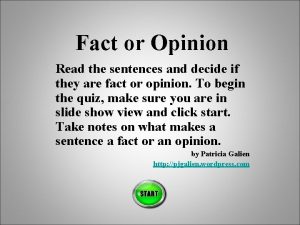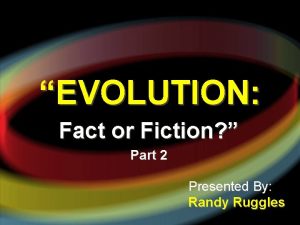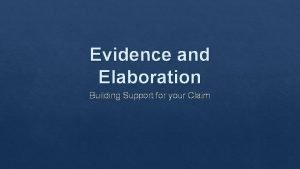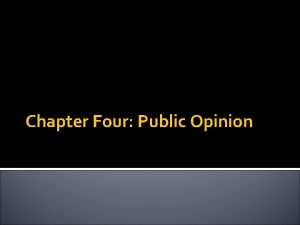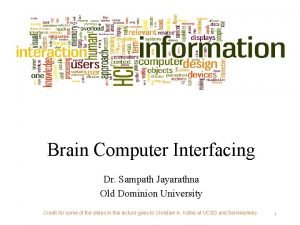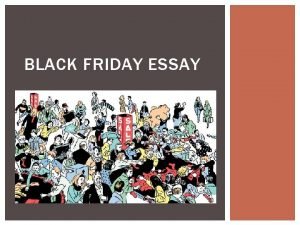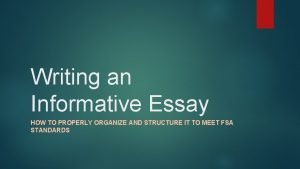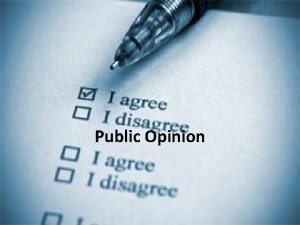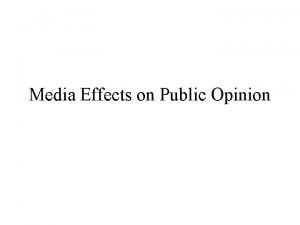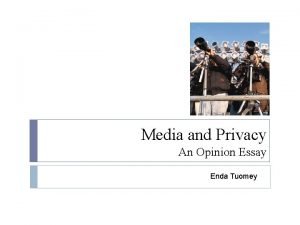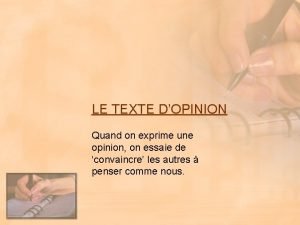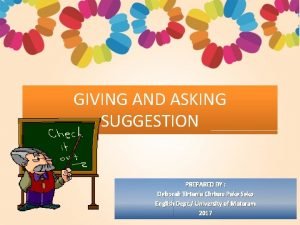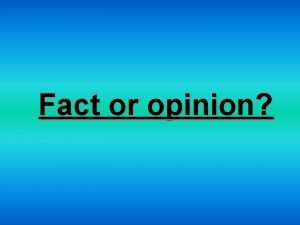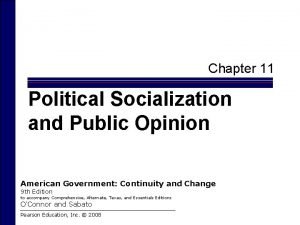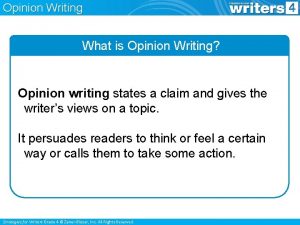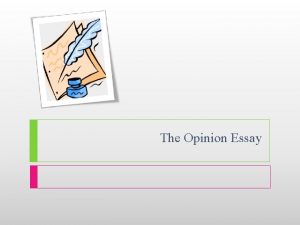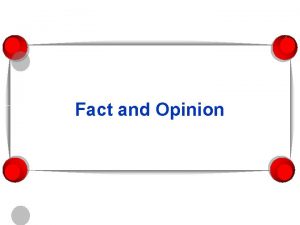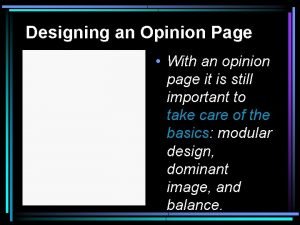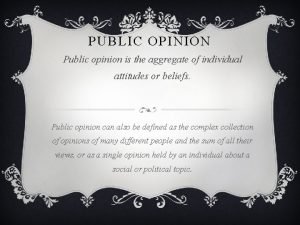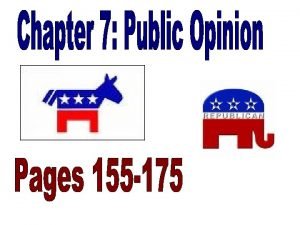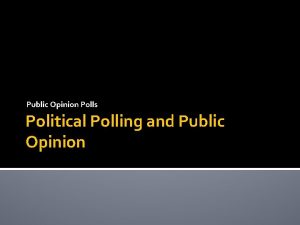In My Opinion What rights are you in










































































































- Slides: 106

In My Opinion… • What rights are you in favor of having?

1. My lawyer and I should be able to question a person who is providing testimony against me in court. Agree or disagree?

2. I should be able to express myself though speeches, writing, artwork, etc. Agree or disagree?

3. I should be protected from cruel and unusual punishment from the government. Agree or disagree?

4. The police should have a search warrant in order to enter my home. Agree or disagree?

5. I should only be tried once for a particular crime. Do it right the first time. Agree or disagree?

6. The government should have to prove that I have committed a crime before I am put in jail. Agree or disagree?

7. I should be able to practice any religion I want without government interference. Agree or disagree?

8. I should not be denied the right to own a gun. Agree or disagree?

9. If a person is afraid of testifying in court they should be able to write their statement down on a sheet of paper and have it read in court Agree or disagree?

10. People should be arrested for burning the US flag when they are protesting against the US government. Agree or disagree?

11. Someone who commits a violent crime should be punished in the same manner as the person they hurt. Agree or disagree?

12. The police should be able to enter the home of repeat criminals to check up on their activities. Agree or disagree?

13. If the police find out that someone has committed a crime even after their trial is finished, they should be able to bring them to court for another trial. Agree or disagree?

14. People who are suspected of carrying out crimes against the US government should be jailed and held so they cannot create additional problems. Agree or disagree?

15. It’s ok to have religious scenes, like the baby Jesus in a manger, set up at the US Post Office during the Christmas season. Agree or disagree?

16. If the government continues to see a rise in the number of children hurt in gun related accidents, it would be ok to limit gun ownership in the homes of people who have children under the age of 12. Agree or disagree?

How did you do? • The responses you had for items 1 -8 should be different from the responses you gave for 11 -16. For example, if you agreed with number 1, you should have disagreed with number 9. Remember, if you would like those rights, you have to be willing to give the same rights to everyone.

Did you give the right to others? • 1. My lawyer and I should be able to question a person who is providing testimony against me in court. • 9. If a person is afraid of testifying in court they should be able to write their statement down on a sheet of paper and have it read in court

Did you give the right to others? • 2. I should be able to express myself though speeches, writing, artwork, etc. • 10. People should be arrested for burning the US flag when they are protesting against the US government.

Did you give the right to others? • 3. I should be protected from cruel and unusual punishment from the government. • 11. Someone who commits a violent crime should be punished in the same manner as the person they hurt.

Did you give the right to others? • 4. The police should have a search warrant in order to enter my home. • 12. The police should be able to enter the home of repeat criminals to check up on their activities.

Did you give the right to others? • 5. I should only be tried once for a particular crime. Do it right the first time. • 13. If the police find out that someone has committed a crime even after their trial is finished, they should be able to bring them to court for another trial.

Did you give the right to others? • 6. The government should have to prove that I have committed a crime before I am put in jail. • 14. People who are suspected of carrying out crimes against the US government should be jailed and held so they cannot create additional problems.

Did you give the right to others? • 7. I should be able to practice any religion I want without government interference. • 15. It’s ok to have religious scenes, like the baby Jesus in a manger, set up at the US Post Office during the Christmas season.

Did you give the right to others? • 8. I should not be denied the right to own a gun. • 16. If the government continues to see a rise in the number of children hurt in gun related accidents, it would be ok to limit gun ownership in the homes of people who have children under the age of 12.

The Bill Of Rights The First 10 Amendments to the United States Constitution period 1 S. Snead

What’s with the additions? • The Constitution describes the powers and authority of the national government. • The first 10 amendments were added to the Constitution and describe the powers and rights of the people.

Amendment One • Probably the most well known amendment. • This amendment protects your freedom of religion, speech, press, assembly and ability to petition the government.

Religious freedom • No state religion can be established and you may worship the way you please, within the boundaries of the law. • Hard to sometimes interpret whether certain activities violate this right. – Do churches have to pay taxes? – Can schools require students to participate in prayer? – Can the government require people who don’t believe in killing to serve in the military? – Can public property be used to display religious symbols

Freedom of Expression • Since the First Amendment was written, the idea of “speech” has been more than just speaking your mind. It had dealt with freedom of expression which can encompass, art, music or even the way you dress. • The Supreme Court has even stated that the burning of the US flag as a method of protest is protected under the First Amendment.

Limits: • Telling lies which injure someone’s reputation (slander) • Creating false panic • Encouraging others to riot • Commit treason • Disrupting a school setting

Freedom of the Press • Without a free press, wrongdoing by the government would never be known. – However, deliberately publishing untrue statements about someone is called libel and is a crime. • Gives people the right to publish their ideas and for others to have access to them. – This is true even if others find the material offensive.

Freedom of Assembly • Americans can meet for demonstrations, political rallies, or to discuss their opinions as long as they are peaceful. • You may also join social groups, political parties and labor unions. • Your rights become limited when the actions of your group are no longer peaceful.

Freedom to Petition • Gives citizens the right to tell the government what they think. • A petition is a formal request that an action be taken. • It can be a letter signed by an individual or by thousands. • Limits arise when the letters become threatening in nature.

Quiz time… 1. Which of the following parts of the first amendment allows citizens to write letters to the president asking for changes in a nonthreatening manner? • A. petition • B. speech • C. religion • D. assembly

Quiz time… 1. Which of the following parts of the first amendment allows citizens to write letters to the president asking for changes in a nonthreatening manner? • A. petition

Quiz Time 2. Which of the following parts of the first amendment allows political parties to meet and discuss changes in the government? • A. petition • B. speech • C. religion • D. assembly

Quiz Time • 2. Which of the following parts of the first amendment allows political parties to meet and discuss changes in the government? • D. assembly

Quiz time… 3. Which of the following parts of the first amendment protects burning the flag as a method of protest? • A. petition • B. speech • C. religion • D. assembly

Quiz time… 3. Which of the following parts of the first amendment protects burning the flag as a method of protest? • B. speech

QUIZ TIME • 4. Which of the following parts of the first amendment prevents the government from forcing everyone to belong to the Baptist church? • A. press • B. speech • C. religion • D. assembly •

QUIZ TIME • 4. Which of the following parts of the first amendment prevents the government from forcing everyone to belong to the Baptist church? • C. religion

Quiz time • 5. Which of the following parts of the first amendment prevents the government from arresting people who print stories about government officials? • A. petition • B. press • C. religion • D. assembly

Quiz time • 5. Which of the following parts of the first amendment prevents the government from arresting people who print stories about government officials? • B. press

Amendment Two: Right to Bear Arms • This amendment guarantees citizens the right to bear arms and serve in a state militia. • This amendment has come under constant fire because of the increased amount of gun violence in our society.

Amendment Three: Quartering Troops • This limits the power of the national government to force citizens to house soldiers. • No soldier can stay during wartime without the authority of the Congress.

QUIZ TIME • 1. Which amendment guarantees the right of citizens to own a gun? • A. 1 st • B. 2 nd • C. 3 rd • D. 4 th

QUIZ TIME • 1. Which amendment guarantees the right of citizens to own a gun? • • B. 2 nd •

Quiz Time • 2. Why has the 2 nd amendment had a great deal of attention in the mass media? • A. school shootings • B. random mass shootings • C. A call by some to limit the amount of assault weapons people can own. • D. All of these factors have contributed to a call for more restrictive gun control laws

Quiz Time • 2. Why has the 2 nd amendment had a great deal of attention in the mass media? • D. All of these factors have contributed to a call for more restrictive gun control laws

Quiz Time • 3. When can a soldier legally stay in a citizen’s home? • A. If the military bases are destroyed after a natural disaster. • B. When we are trying to save money for the government • C. In a time of war, if approved by Congress • D. If the President thinks it is necessary.

Quiz Time • 3. When can a soldier legally stay in a citizen’s home? • C. In a time of war, if approved by Congress

Fourth Amendment: Privacy Amendment • This amendment protects citizens from unreasonable search and seizures. • A reason is necessary for all warrants to search. The warrant must describe and name what is being sought and where you will be searching. • An arrest warrant gives officers permission to take a person into custody.

School Issues • The courts have ruled that neither warrants nor probable cause are necessary if school officials have good reason to think that a search will turn up evidence that a student has broken the law or the rules of the school.

Quiz Time • 1. What document allows an officer to search a home? • A. A writ of habeus corpus • B. A writ of assistance • C. A warrant • D. An indictment

Quiz Time • 1. What document allows an officer to search a home? • C. A warrant

Quiz Time • 2. How is a warrant different than the writs of assistance? • A. A warrant is only good for an hour. • B. A writ is very specific. • C. A warrant is very specific. • D. A warrant can be used anywhere.

Quiz Time • 2. How is a warrant different than the writs of assistance? • C. A warrant is very specific.

Quiz Time • 3. What institution does the court allow searches to occur without a warrant or probable cause if there is reason to believe that a law or rule has been broken. • A. hospital • B. school • C. homes • D. health clinics

Quiz Time • 3. What institution does the court allow searches to occur without a warrant or probable cause if there is reason to believe that a law or rule has been broken. • • B. school •

Fifth Amendment: Rights of the Accused • Must be indicted by a grand jury • No double jeopardy • Don’t have to testify against yourself. • Due process of law • Protection in cases of eminent domain

Grand jury • A grand jury is a group of people who decide whethere is enough evidence to suggest that a person committed a crime. • This process protects people from being tried without evidence and keeps the courts from being tied up in pointless trials. • Usually a 6 month to year long process. You meet when needed.

Double Jeopardy… Self-incrimination • You can’t be tried twice for the same crime. – Even if more evidence is found later to prove you are guilty. • Can’t be forced to testify when it might cause people to believe that you committed the crime. Doesn’t cover not wanting to testify in general. – Sometimes known as “taking the fifth”.

Due Process • No one’s life, liberty or property can be taken away without due process of law. – A chance to be heard – Proceedings will be fair and notice will be given – Laws must be reasonable to the average person – Must be found guilty beyond a reasonable doubt.

Eminent domain • The government has the power to take private property for public use. – However, they must give you fair payment for it. • Road expansion • School being built

Sixth Amendment: Right to a Speedy Public Trial • Requires a public trial by jury • A speedy trial – 90 days for a misdemeanor – 175 days for a felony. • • Call witnesses Right to a lawyer Hear witnesses against you Right to hear the charges against you

Miranda Rights • The rights protected under the 5 th and 6 th amendments are often called your Miranda Rights. • Reminds a suspect they have certain rights they may exercise when being questioned. • Miranda v Arizona case

Quiz Time • 1. What does “taking the fifth” refer to? – A. refusing to testify against yourself – B. being tried twice for a crime – C. Asking to hear the witnesses – D. Being able to call witnesses.

Quiz Time • 1. What does “taking the fifth” refer to? – A. refusing to testify against yourself

Quiz Time • 2. What is the purpose of a speedy trial – A. It allows the state to put you in jail more quickly – B. It forces the defense to find witnesses in a hurry – C. It forces the government to provide you with a lawyer. – D. It prevents someone from having to wait forever for their trial.

Quiz Time • 2. What is the purpose of a speedy trial – D. It prevents someone from having to wait forever for their trial.

Quiz Time • 3. What rule allows the government to take private property for public use? – A. Double jeopardy – B. eminent domain – C. Due process – D. rule of law

Quiz Time • 3. What rule allows the government to take private property for public use? – B. eminent domain

Quiz Time • 4. This process protects people from being tried without evidence and keeps the courts from being tied up in pointless trials. – A. Double jeopardy – B. eminent domain – C. Due process – D. Grand jury indictment

Quiz Time • 4. This process protects people from being tried without evidence and keeps the courts from being tied up in pointless trials. – D. Grand jury indictment

Quiz Time • 5. Which one of these rights is part of the “Miranda Rights” • A. You have the right to remain silent • B. You have the right to a speedy trial • C. You have the right to free speech • D. You have the right to call witnesses.

Quiz Time • 5. Which one of these rights is part of the “Miranda Rights” • A. You have the right to remain silent

Seventh Amendment: Civil Suits • Trial by jury in civil cases in which the amount is more than 20 dollars. • You may have it settled by a judge if you prefer. • Settling an issue when people disagree about property or money • The judge cannot overturn a jury’s decision in a civil case.

Eighth Amendment: No Cruel and unusual Punishment or Excessive Bails and Fines • A limit is placed on the amount of fines or bail you have to pay. – A fine is payment to the court for breaking a law. – Bail is money paid to remain out of jail until your court date. • Limit on the types of punishments that can be used on people.

Ninth Amendment: Powers Reserved to the People • All of your rights are not listed in the Constitution. • That doesn’t mean you don’t have them. – Right to live where you want – The right to choose the school you want your kids to attend – Right to travel freely

Tenth Amendment: Powers Reserved to the States • This amendment is a reminder of what the Constitution does not say. • Any powers the Constitution does not specifically give to the national government are reserved for the people and the states. • Helps balance the power between the states and national government.

• 1. How much money must be at risk in order to have a trial by jury in a civil case? • a. $20 • b. $200 • c. $2000 • d. $20, 000

• 1. How much money must be at risk in order to have a trial by jury in a civil case? • a. $20

2. What is bail money used for? • a. to pay your fine • b. to avoid going to jail • c. to get out of jail until your trial • d. to pay your lawyer

2. What is bail money used for? • • c. to get out of jail until your trial •

3. How many amendments are considered part of the Bill of Rights? • a. 4 b. 6 • c. 10 d. 27

3. How many amendments are considered part of the Bill of Rights? • c. 10

How About The Rest? • There are seventeen other amendments added to the Constitution. • They include, among others, the right to vote, establishing an income tax, abolishing slavery and the limit on Presidential terms of office.

13 th Amendment: Slavery Abolished • Added in 1865, It put an end to slavery, except as a punishment for a crime that someone has been convicted of. • This was a result of the Civil War.

14 th Amendment: Equal protection • All citizens of the United States will be given equal protection under the law. This prevents states from taking away a person’s civil rights based on their age, sex, race or religion. • The right to vote in a presidential election cannot be denied to Any males 21 and older unless they were involved in a rebellion or other crime. • Anyone who fought against the US cannot hold office unless they take an oath of loyalty. • Debts incurred by the Confederacy are not the responsibility of the US government or its states.

15 th Amendment: The right to vote • The right to vote cannot be denied to anyone based on their race, color, or previous servitude. • This was passed to ensure that newly freed slaves could vote.

19 th Amendment: Women’s suffrage • Gave women the right to vote. • Took until 1920

23 rd Amendment: DC votes in Presidential elections • Until 1961, people who lived in Washington DC could not vote in presidential elections. • This amendment allowed DC 3 electoral votes.

24 th amendment: Abolition of poll tax • Citizens could not be charged a tax in order to vote in national elections of the President or Congressional elections. • This tactic was used in southern states to keep poor people from voting.

26 th Amendment: 18 year old vote • • • Any citizen 18 years of age or older had the right to vote. Brought about because we had young men and women serving in the military, but they could not vote. Passed in 1971

• 1. The 13 th amendment _____ slavery in the United States. • a. abolished b. continued c. limited • d. extended

• 1. The 13 th amendment _____ slavery in the United States. • a. abolished

Quiz Time • 2. After many years of marches and protests, the 19 th amendment gave voting rights to ____ in 1920. a. African Americans b. D. C. residents c. Women d. d. 18 year olds

Quiz Time • 2. After many years of marches and protests, the 19 th amendment gave voting rights to ____ in 1920. c. women

Quiz Time • 3. The 24 th amendment ended the use of _______required by some states for new voters to be able to cast their vote. • a. identification • b. reading tests • c. passports • d. poll taxes

Quiz Time • 3. The 24 th amendment ended the use of _______required by some states for new voters to be able to cast their vote. • d. poll taxes

Quiz Time 4. The 26 th amendment gave voting rights to ______ in 1971. a. African Americans b. women c. D. C. residents d. 18 year olds

Quiz Time 4. The 26 th amendment gave voting rights to ______ in 1971. d. 18 year olds

Quiz Time • 5. What are the first words of the U. S. Constitution? • A. When in the course of human events. . . • B. We the people. . . • C. One nation under God. . . D. I have a dream. . .

Quiz Time • 5. What are the first words of the U. S. Constitution? • • B. We the people. . . •
 Insidan region jh
Insidan region jh Private opinion becomes public opinion when
Private opinion becomes public opinion when Negative rights vs positive rights
Negative rights vs positive rights Riparian rights
Riparian rights Legal rights and moral rights
Legal rights and moral rights Legal rights and moral rights
Legal rights and moral rights Negative rights vs positive rights
Negative rights vs positive rights Negative rights vs positive rights
Negative rights vs positive rights Positive vs negative rights
Positive vs negative rights Positive rights and negative rights
Positive rights and negative rights Can you make them behave king george fact and opinion
Can you make them behave king george fact and opinion What comes to your mind when you hear the
What comes to your mind when you hear the What are you human rights
What are you human rights Child rights and you rippan kapur
Child rights and you rippan kapur You say you love the rain
You say you love the rain Good health is a choice agree or disagree
Good health is a choice agree or disagree If you think you can you can poem
If you think you can you can poem Tell me what you eat and i shall tell you what you are
Tell me what you eat and i shall tell you what you are Wherever you go we follow
Wherever you go we follow Opinion essay ecpe
Opinion essay ecpe Opinion essay plan
Opinion essay plan Writing a series of paragraphs expressing an opinion
Writing a series of paragraphs expressing an opinion Opinion questions examples
Opinion questions examples Types of opinion writing
Types of opinion writing Features of an opinion column
Features of an opinion column Hunger games chapter 14 questions and answers
Hunger games chapter 14 questions and answers Thanksgiving facts
Thanksgiving facts Examples of opinion paragraphs
Examples of opinion paragraphs Bing
Bing Sbac writing rubrics
Sbac writing rubrics Provide your opinion
Provide your opinion Powtoon opinion writing
Powtoon opinion writing An opinion paragraph
An opinion paragraph Opinion-size-shape-color-origin-material-purpose noun
Opinion-size-shape-color-origin-material-purpose noun Determiner opinion size age shape
Determiner opinion size age shape Should schools have dress codes essay
Should schools have dress codes essay Opinion definition
Opinion definition Evidence of opinion definition
Evidence of opinion definition Introduction of opinion essay
Introduction of opinion essay News opinion and sports are types of
News opinion and sports are types of Conclusion sobre un tema
Conclusion sobre un tema Types of teees
Types of teees Hazelwood v. kuhlmeier facts
Hazelwood v. kuhlmeier facts Executive opinion forecasting example
Executive opinion forecasting example Fifty nifty united states
Fifty nifty united states 50 nifty united states
50 nifty united states Family fact and opinion
Family fact and opinion Facts and opinions about pizza
Facts and opinions about pizza Opinions are better than facts in supporting arguments
Opinions are better than facts in supporting arguments Fact and opinion jeopardy 4th grade
Fact and opinion jeopardy 4th grade Jeopardy fact and opinion
Jeopardy fact and opinion Chocolate tastes better than milk fact or opinion
Chocolate tastes better than milk fact or opinion Advantages of expert opinion method
Advantages of expert opinion method Opinion column format
Opinion column format Note on expository essay
Note on expository essay Estructura de una opinión
Estructura de una opinión Fact or opinion examples
Fact or opinion examples Escalas de actitud y opinión
Escalas de actitud y opinión Public opinion essay
Public opinion essay My consult
My consult Roe vs wade background
Roe vs wade background Chapter 8 mass media and public opinion worksheet answers
Chapter 8 mass media and public opinion worksheet answers Chapter 8 section 3 the mass media
Chapter 8 section 3 the mass media Types of audit opinion
Types of audit opinion Caricatura periodística
Caricatura periodística Asking giving opinion
Asking giving opinion Asking and giving opinion about bullying
Asking and giving opinion about bullying Whats an argumentative essay
Whats an argumentative essay I thought there was a of jealousy
I thought there was a of jealousy How to write a conclusio
How to write a conclusio Size shape age color
Size shape age color Opinion vs argument
Opinion vs argument Subjunctive with impersonal expressions
Subjunctive with impersonal expressions Which statement is an opinion?
Which statement is an opinion? 1984 chapter questions
1984 chapter questions Thesis statement blueprint
Thesis statement blueprint Opinion essay structura
Opinion essay structura Giving opinion essay
Giving opinion essay Siapakah pelaksana public opinion polling
Siapakah pelaksana public opinion polling Chapter 7 public opinion
Chapter 7 public opinion The hamburger technique
The hamburger technique Jury of executive opinion method
Jury of executive opinion method Opinion essay structure
Opinion essay structure Example of opinion
Example of opinion Opinion essay conclusion
Opinion essay conclusion Opinion limpia
Opinion limpia Corn-pone opinions summary
Corn-pone opinions summary Digi opinion
Digi opinion On avoiding foolish opinions notes
On avoiding foolish opinions notes Le clase
Le clase Fact and opinion sentences
Fact and opinion sentences Evolution fact or fiction
Evolution fact or fiction Evidence and elaboration example
Evidence and elaboration example Public opinion is both an elusive and fragile commodity.
Public opinion is both an elusive and fragile commodity. Odu student opinion survey
Odu student opinion survey Paragraph on good friday
Paragraph on good friday How to write a thesis for an informative essay
How to write a thesis for an informative essay Public opinion essay
Public opinion essay Opini ilmiah populer
Opini ilmiah populer Opinion
Opinion Public opinion essay
Public opinion essay Les verbes d'opinion dans le texte argumentatif
Les verbes d'opinion dans le texte argumentatif Identify the expressions of asking and giving opinions
Identify the expressions of asking and giving opinions Difference between fact and opinion
Difference between fact and opinion Fact and opinion jeopardy 4th grade
Fact and opinion jeopardy 4th grade Exante opinion
Exante opinion Public opinion and political socialization
Public opinion and political socialization

